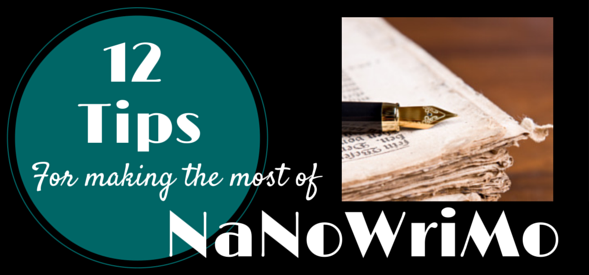Will you take the NaNo plunge?
In many ways the purpose of NaNo is the same as the writing community's purpose — it’s about making the writing happen. The main difference I see is that in my writing community we focus on writing year round, in a sustainable way. With NaNo, the focus is on writing intensely for a shorter duration of time. Both approaches have pros and cons.
If you're on the fence about doing NaNo, here are some things to consider:
Advantages
- It's inspiring to write alongside other writers, especially with the same goal.
- ... and there’s a very clear focused goal: 50,000 words in 30 days.
- It helps keep you focused on one specific project instead of hopping from project to project and losing your way.
- Meeting a big goal in short amount of time can feel amazing and inspiring.
- It’s a great way to make a concerted push on a big project.
- When you write fast, you bypass your logical left brain and your inner critic. The results can be magical.
- It IS possible to write fast and write well.
Challenges
- Writing 1,667 words every day can be a lot for some writers.
- Not meeting the daily goal increases the number of unwritten words as each day ticks past, which then creates pressure to catch up.
- Writing every day at an intense pace can lead to creative burnout and writing aversion after the big push. Some writers report writing hard during NaNoWriMo and not writing for the rest of the year.
- Not meeting the goal might feel discouraging.
- Writers sometimes report generating a ton of words, but that the quality feels lacking.
12 tips for making the most of NaNoWriMo
If you do decide to go for it — and I hold no judgment either way, in writing it's all about what works for YOU — here are some ideas that might help you along the way.
Before NaNo
- Design your month around the effort. This could look like cutting back on extra activities, getting extra childcare, taking some time off work, etc. Really think about how you can make it EASY to meet this big goal.
- Be crystal clear about when you’re scheduling your writing time so there’s no doubt about when you’ll do it. Get out your calendar for the entire month and map out when you'll be spending the 1.5 to 2 hours you'll likely need each day.
- If you’re not a “panster”, work on your outline for your project NOW so you can start writing when the clock starts ticking. Even if you just map out the major story beats, you'll have something to swim toward when you're out there in the ocean of words you're about to dive into.
- Up-level your self-care and creative well-filling. Healthy food, lots of water, time in the sunshine, exercise, and lots of great creative inputs will help keep you humming at an optimal level throughout the month. (And keep this up DURING NaNo too.)
- Get lots of non-writing support for the rest of your life like bill-paying, grocery delivery, etc., or work on getting things in order now so you don't have to be distracted by them while you're neck deep in writing.
During NaNo
- Use timed writing sprints to help you write briskly for your daily writing goals. It has the added benefit of teaching you how long it takes you to write a certain number of words as well, so you'll know if you need to adjust how much time you're setting aside for scheduled writing time in #2, above. Plus you can use the sprints to break up the longer chunks of writing so that you get up and stretch between sessions. In my writing community we usually write in 60 minute sprints, but a good sprint can range in length from 15 to 90 minutes. Find what works best for you.
- Be mindful about your self-talk and keeping it as encouraging and self-supportive as possible. Notice any negative self-messages that come up and find a way to reframe them into a more positive perspective.
- Pay attention to how it’s feeling and working for you. There are no rights or wrongs here, no failures. You may want to experiment with challenging your own comfort zone or you may find that this is a method that doesn't work for you. It's ALL useful information that will only help you going forward.
- Have a support system outside NaNo like a writing group, community, or buddy to cheer you on and help keep things in perspective. If you're struggling, get help and support. You don't have to do this alone.
After NaNo
- Celebrate! When the end of NaNo rolls around, one way or another, celebrate. If you met the goal, great! Celebrate it. If you didn't meet the goal, make sure to celebrate the attempt.
- Rest! Once you're done, take one to two days off after NaNo and really enjoy it.
- Write! Then, start writing again. Make a plan for how you’ll keep writing after NaNo. This could look like keeping up the same pace if it worked for you or adjusting it up or down to find your new happy medium of accomplishment, sustainability, and attainability. You may find that you want an extra easy writing goal for the first week after the big NaNo push, which you can then reassess and adjust as needed.
You may also be interested in:





0 Comments